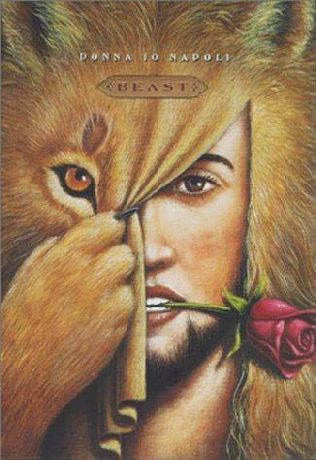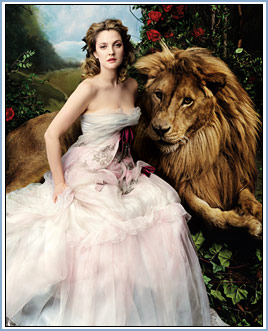
I feel ashamed to admit I had never read Donna Jo Napoli's Beast before now. My mom had read it and told me it wasn't good. I can see why she wouldn't want me to read a story where the enchanted Prince has sex with a lion. I kept thinking about Beauty and wondering if she would ever know that the man she would eventually marry had once "recieved a lioness," as Napoli puts it.
Overall I liked it. The writing style is a bit choppy, and in present tense, which at first takes some time to get used to. Plus, in the beginning section, she throws a lot of foreign words in which she has to then define, or spends a lot of time describing Persian culture or aspects of the Mulsim religion. It bogged down the reader a bit because the action was slowed down and it was harder to picture in my head.

The story starts in Persia and the Prince is named Orasmyn-taken from the Charles Lamb poem. So I expected the story to be more original than the traditional details of the French version, but it was actually really cool how everything made sense in the end and became the story we all know.

This story is unique for taking the perspective of the Beast. He starts off as the Prince of Persia, a very disciplined and religious man, who seems almost too much like a woman's ideal of a "perfect man" to be realistic-he doesn't like violence or hunting, he likes roses instead, etc. But then when the fairy curses him (for making an improper sacrifice in a religious ceremony) he becomes a lion. And not just a man in a lion's skin, as if he were wearing a costume he couldn't take off-like we often think of the Beast-but the mind of a man conflicting with the mind of a lion, inside a lion's body, with all of a lion's instincts and desires. This aspect of the plot helped deepen his character a lot. As disciplined and perfect as he was before, even he has trouble keeping the human side of him in tact. And it's a lesson we could all learn-we all tend to put our stomache, or our lust or other instinctive desires before what we know is good for ourselves, or for others.

I chose to illustrate this post with pictures from Vogue of Drew Barrymore as Beauty because that version also has the Beast as a literal lion. Most Beasts tend to be a conglomeration of animals (bears are common for the Beast though), but Orasmyn became fully lion. He couldn't even talk or walk on his hind legs, like most Beasts.
The middle section of the book deals with Orasmyn trying to live as a lion-adapting to his new body and living in the wild. I can't imagine the research that went into this book, but aside from the educational value, I kept wanting it to get to the part where Beauty would show up.

She finally did. And like Orasmyn's original character, she also came off as a bit too perfect to me. Yet it also made me realize how Beauty-centric most versions are. Everyone loves to imagine themselves in a castle that immediately grants every desire. Since the Beast also has invisible magical servants, there's no need for Beauty to do anything for him. In Napoli's version, there are no magical servants. He has to feed himself as well as creates gardens suitable for Belle's food and provide for her human needs, which is difficult enough for a human, more difficult for a lion. In fact I kept wishing I could hear the story from Belle's perspective, and then being like, oh yeah...that's pretty much every other version.
But, each author gives Beauty and the Beast their own unique spin, and I wouldn't mind reading Napoli's Beauty's backstory too. Though it isn't my favorite version (no one can hold a candle to Robin McKinley's Beauty in my opinion,) it gives the reader a lot to think about and chew on long after the book is finished, which is one thing I really like in a book.
Excerpt:
"Belle is human. I am lion. Belle is human. I am lion. Belle is human. I am lion.
The chant rolls in my head.
She hums.
The chant dissipates.
Belle hums as she eats.
Like a lioness.
Is this the work of the pari [fairy] who distorts every moment, makes every moment a source of temptation?"

No comments:
Post a Comment